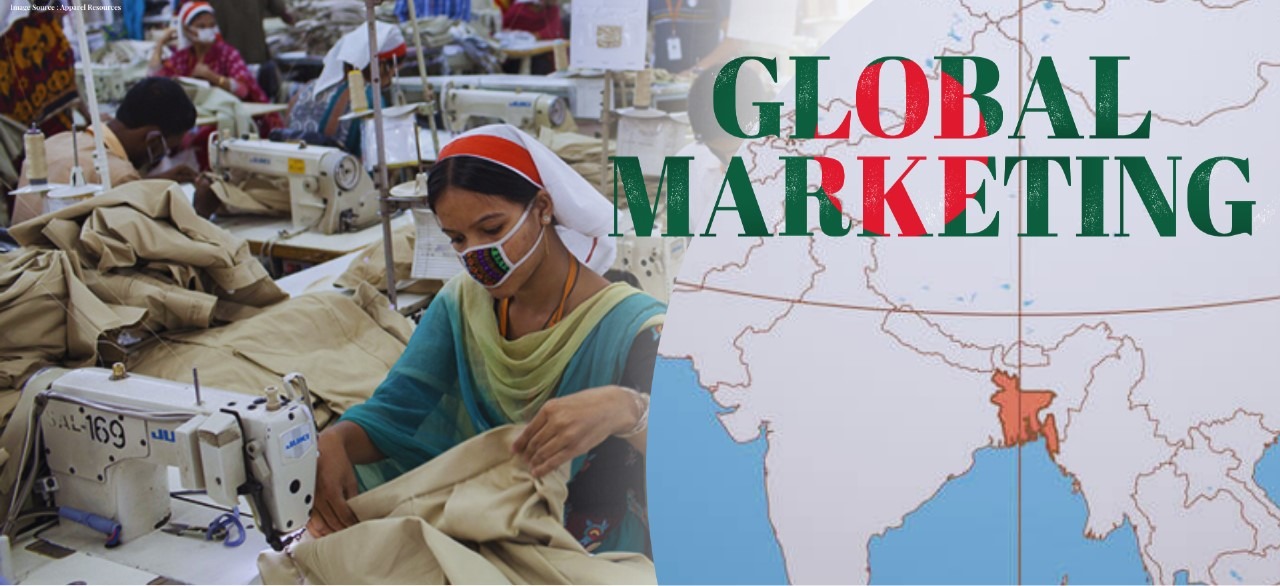Introduction
Bangladesh’s garment manufacturing industry has been the cornerstone of the nation’s economic success story. It’s not just about churning out clothes; it’s about creating millions of jobs, driving growth, and now, weaving a new path towards becoming a proactive player in the global fashion arena.
The industry’s strength lies in its skilled workforce, honed over decades of experience. This, coupled with competitive production costs, has made Bangladesh a magnet for major fashion brands. The numbers are staggering, Bangladesh boasts over 80% of its export revenue coming from garments, translating to a whopping $47.39 billion in 2023 alone (Export Promotion Bureau, 2024).
Beyond the Seams: A Shift in Strategy
However, Bangladesh is no longer content with being the silent workhorse behind the world’s most coveted brands. There’s a paradigm shift underway, and the industry is transitioning from a subcontractor to a style auteur, one with a story to tell and a desire for a bigger slice of the fashion pie, both in terms of profit margins and brand recognition.
The digital revolution is a key driver in this transformation. The transformative power of social media and targeted online campaigns is acknowledged as pivotal in driving this change (Intellec IT Ltd. 2024). Imagine the latest Dhaka designs going viral on Instagram, not just adorning the shelves of major retailers. This is the vision that initiatives like Posh Garments’ digital marketing efforts (Posh Garments Ltd., n.d.) are striving for.
By embracing a proactive marketing approach, Bangladesh is not just showcasing its expertise but also building brand awareness on a global scale.
Challenges Faced by Bangladesh in Global Marketing
Bangladesh’s garment industry has become a global titan, churning out clothes for major fashion houses and generating billions in revenue. However, beneath the seemingly smooth fabric lies a tangled web of marketing challenges that threaten to restrict Bangladesh’s growth and limit its potential to become a true fashion leader.
Limited Brand Recognition:
One of the most pressing issues is the industry’s struggle with brand recognition. Unlike their Western counterparts, Bangladeshi manufacturers often operate in the shadows. Research by Mordor Intelligence (2023) suggests that Bangladesh is a silent powerhouse, contributing significantly to a projected $1.02 trillion global textile and apparel market by 2028. Yet, individual Bangladeshi brands remain virtually unknown to consumers. This anonymity makes it difficult to command premium prices and establish themselves as trendsetters.
Price-Driven Competition:
Another challenge is the constant pressure of price-driven competition. With numerous countries vying for a slice of the global garment pie, Bangladesh often finds itself in a race to the bottom, offering the lowest possible prices to secure contracts. This relentless focus on cost-cutting can come at the expense of quality and innovation. Studies by the BGMEA (2023) acknowledge this and emphasize the need to move beyond just price competitiveness. The industry needs to showcase the value it offers, not just the rock-bottom price tag.
Lack of Marketing Expertise:
Compounding these challenges is the lack of marketing expertise within the industry. Traditionally, the focus has been on production efficiency, with marketing taking a backseat. This lack of experience hinders the industry’s ability to effectively utilize digital marketing tools, build compelling brand stories, and connect with a global audience on social media platforms.
Ethical Sourcing Concerns:
Finally, the industry continues to grapple with the shadow cast by past incidents of safety hazards and worker rights violations. While initiatives like the Bangladesh Accord have made significant strides in improving working conditions (The Daily Star, 2024), the industry needs to continuously demonstrate its commitment to ethical practices and social responsibility. Consumers today are more conscious than ever, and regaining trust requires transparency and a proactive approach.
Suggestions to overcome challenges faced by Bangladesh in Global Marketing
While renowned for its skilled workforce and competitive production costs (BGMEA, 2023), the industry struggles to translate these strengths into brand recognition and market leadership on the global stage. To overcome these marketing challenges, Bangladesh’s garment sector needs a strategic shift, focusing on building brand identity, value-based marketing, digital outreach, and strategic partnerships.
Building Brand Identity:
The industry’s first stitch towards success lies in crafting a unique brand identity. This can be achieved by:
- Developing unique brand stories: Bangladesh boasts a rich cultural heritage and a skilled workforce. Highlighting these strengths through captivating brand stories can resonate with consumers seeking authenticity. Imagine a brand narrative that showcases the time-honored techniques of Bangladeshi weavers (as documented in the documentary “The Sari Project”) or the vibrant textile traditions of the region.
- Investing in design and innovation: Moving beyond replicating trends, Bangladeshi manufacturers can differentiate themselves through innovative design and a focus on emerging fashion styles. This requires investing in design talent and fostering a culture of creativity within the industry, as highlighted by the Bangladesh Garment Manufacturers and Exporters Association (BGMEA, 2023).
Value-Based Marketing:
The next step involves a shift from price-driven marketing to value-based marketing. Consumers are increasingly seeking quality, sustainability, and ethical production practices (The Business of Fashion, 2023). Here’s how Bangladesh can capitalize on this trend:
- Focus on quality, sustainability, and ethical production: Implementing stringent quality control measures and adopting sustainable practices such as using organic cotton or recycled materials demonstrates a commitment to responsible production.
- Emphasize certifications and social responsibility initiatives: Highlighting certifications like Fair Trade or LEED (Leadership in Energy and Environmental Design) builds trust and attracts environmentally and socially conscious consumers. Additionally, showcasing initiatives that empower workers and promote fair labor practices enhances brand image.
Digital Marketing Strategies:
In today’s digital world, a robust online presence is crucial. Bangladesh’s garment industry can leverage this by:
- Utilizing online platforms to reach a wider audience: Creating informative websites with high-quality product photography, brand stories, and ethical practices allows consumers to connect with Bangladeshi brands directly. Additionally, showcasing design capabilities through online portfolios can attract international design houses and fashion labels seeking manufacturing partners.
- Implementing targeted marketing campaigns using social media and e-commerce: Social media platforms like Instagram and Facebook offer unparalleled reach. Creating engaging content, collaborating with fashion influencers, and running targeted ads can attract a global audience. Furthermore, developing e-commerce platforms allows for direct sales to consumers, eliminating middlemen and increasing profit margins (Posh Garments Ltd., n.d.).
Building Strategic Partnerships:
Collaboration is key to success. Here are two avenues for strategic partnerships:
- Collaborate with international brands for design and marketing expertise: Partnering with established international fashion brands can provide valuable design input, marketing expertise, and access to a wider consumer base. These partnerships can be mutually beneficial, allowing international brands to leverage Bangladesh’s production expertise while Bangladeshi brands gain exposure to new markets and design trends.
- Partner with ethical fashion organizations to enhance brand image: Collaborating with organizations promoting ethical fashion practices fosters consumer trust and reinforces Bangladesh’s commitment to social responsibility.
How Groyyo can be the key contributor to overcome these challenges
Bangladesh’s garment industry, a global engine churning out billions in clothing exports, faces a challenge: translating its manufacturing might into fashion influence. Consumers often associate innovative styles and trendsetting designs with established fashion capitals, leaving Bangladesh’s garment sector in the realm of anonymous production. Groyyo Consulting, a consulting firm with a global perspective, can be the missing thread, weaving a new narrative for Bangladesh’s garment industry and propelling it towards fashion leadership.
1. Design Innovation: From Replication to Trendsetting
Groyyo Consulting goes beyond marketing tactics, focusing on fostering design innovation within the industry:
● Bridging the Design Gap: Groyyo Consulting can help build connections with international design houses and fashion schools. This allows Bangladeshi manufacturers to gain exposure to emerging trends and collaborate on innovative designs, transforming them from replicating trends to setting them.
● Investing in Local Talent: Groyyo Consulting can spearhead initiatives to identify and nurture local design talent within Bangladesh. This could involve organizing design competitions, sponsoring fashion design programs, or establishing design incubators. By empowering a local design force, Bangladesh can cultivate a unique design identity.
2. Digital Storytelling: Weaving Brand Narratives
In today’s digital age, a compelling online presence is crucial. Groyyo Consulting can help Bangladesh’s garment industry tell its story:
● Crafting Captivating Content: Groyyo Consulting’s expertise in content creation can be harnessed to develop engaging social media campaigns and informative websites. This content should showcase the craftsmanship, rich cultural heritage, and commitment to ethical practices that define Bangladeshi garment production.
● Building Brand Communities: Groyyo Consulting can help build online communities around Bangladeshi garment brands. This could involve collaborating with fashion bloggers and influencers, hosting online events, and fostering interactive social media interactions. These communities allow Bangladeshi brands to connect directly with consumers, build brand loyalty, and cultivate a passionate following.
3. Sustainable Practices: From Fast Fashion to Eco-Conscious Choices
Groyyo Consulting can help Bangladesh’s garment industry embrace sustainability as a competitive advantage:
● Adopting Eco-Friendly Practices: Groyyo Consulting’s process optimization expertise can be used to implement sustainable practices like using organic cotton, recycled materials, and eco-friendly dyes. This caters to the growing consumer demand for environmentally responsible fashion.
● Transparency Builds Trust: Groyyo Consulting can help establish robust traceability systems within the supply chain. This allows consumers to understand the environmental impact of garments and fosters trust in brands committed to sustainable practices.
4. Data-Driven Decisions: From Intuition to Insights
Groyyo Consulting’s expertise extends beyond traditional consulting, leveraging data to drive strategic decision-making:
● Market Intelligence for Informed Strategies: Groyyo Consulting’s market research skills can be used to gather data on consumer preferences, emerging trends, and competitor analysis. This data can inform strategic decisions around marketing campaigns.
● Metrics for Measurable Success: Groyyo Consulting can help establish key performance indicators (KPIs) to track the success of marketing campaigns, brand awareness initiatives, and ethical practices implementation. This data-driven approach allows Bangladeshi brands to continuously measure progress and refine their strategies for maximum impact.
By partnering with Groyyo Consulting, Bangladesh’s garment industry can transform itself from a production powerhouse to a fashion trendsetter. Groyyo Consulting’s focus on fostering design innovation, building digital brand narratives, embracing sustainability, and utilizing data-driven insights empowers Bangladeshi brands to tell their unique stories, connect with consumers on a deeper level, and claim their rightful place as a leader in the global fashion landscape. This strategic collaboration promises not just economic growth but also a chance for Bangladesh to showcase its creativity, commitment to sustainability, and influence on the world stage, one thread at a time.

Email- divyamohan@groyyo.com


Leave a Comment